By Prof. Nico A. Caballes, LPT
The HAL101 (Fundamentals of Halal) Training of Teachers (TOT) for the MSU System – Phase 1 was successfully conducted from July 27 to 29, 2025, at Training Center Building, King Faisal Center for Islamic, Arabic and Asian Studies, Mindanao State University – Marawi Campus. This initiative was organized by the Committee for the Implementation of HAL101 Course Offering chaired by Atty. Saaduddin M. Alauya, Jr. in partnership with the King Faisal Center for Islamic, Arabic and Asian Studies (KFCIAAS) and the Institute for Peace and Development in Mindanao (IPDM), the training brought together faculty members and selected participants from various MSU campuses and colleges. The program aimed to equip educators with foundational knowledge of the Halal ecosystem and foster strategies for integrating Halal principles into teaching and other academic development.
The training opened with a formal registration, invocation, and the singing of the Philippine National Anthem, the Bangsamoro Hymn, and the Bagong Pilipinas Hymn, followed by a multimedia presentation. Setting a collegial and reflective tone for the event, Atty. Jashim Abdulrahman, Dean of KFCIAAS, welcomed the participants. This was followed by an orientation session led by Mr. Almahdi Alonto, Peace Education Officer of IPDM, who presented the objectives, expected outcomes, and the rationale for offering HAL101 across the MSU System.
To contextualize the training, Dr. Acram Latiph, Director of the Institute for Peace and Development in Mindanao (IPDM) at MSU Marawi Campus, delivered the opening lecture, offering a comprehensive overview of the principles of Halal and presenting a proposed structure for effectively delivering Halal instruction in the academic setting. In the afternoon session, Aleem Siddiqui Matabalao Guiapal, Program Manager for Industry Development and Investment Promotions at the DTI Halal Development and Trade Office, presented an in-depth discussion on trade and investment opportunities in the Philippine Halal sector, highlighting the strategic role of education in advancing national Halal industry goals. The first day concluded with an engaging participatory workshop facilitated by Prof. Nico A. Caballes, faculty member of the Department of Home Economics, College of Education. During the session, participants were grouped and tasked to reflect on their learning using the KWL (Know–Want to Know–Learned) Chart, resulting in meaningful exchanges and initial group outputs.
On the second day, the focus shifted to the broader Halal ecosystem which was discussed by Dr. Rashdi Casim, Assistant Dean of the College of Agriculture, followed by a productive Q&A session. Later in the day, Dr. Acram Latiph returned to discuss the opportunities and challenges of Halal, while Dr. Abdulcader Ayo, a member of the MSU System Transition Committee, presented a regional perspective on Halal development in Southeast Asia and the Philippines. Workshops throughout the day provided a platform for faculty members to propose a curriculum integration strategies using the BOR-approved HAL101 course syllabus.
The final day emphasized consolidation and closure. Prof. Hasniyah C. Balenti synthesized the key themes and insights from the previous days, highlighting participant outputs and shared directions moving forward. The training culminated in an awarding ceremony where certificates were distributed to all attendees in recognition of their active participation. The event was formally concluded with closing remarks and a Du’a led by Prof. Mohammad Jihan Macarambon, Special Assistant of the Office of the MSU System President.
Over the course of three days, more than 40 faculty members and campus representatives engaged in intensive learning and collaboration. They contributed to curriculum design proposals and deepened their understanding of Halal not only as a religious concept but as a multidisciplinary and developmental framework. The program emphasized Halal’s relevance across fields such as agriculture, public health, education, tourism, business, and policymaking.
The HAL101 Training of Teachers – Phase 1 stands as a significant milestone toward institutionalizing Halal education in the MSU System. It laid the groundwork for academic integration, inter-campus collaboration, and alignment with the university’s mission of peacebuilding, moral integrity, and inclusive national development. The initiative reflects the shared commitment of MSU’s academic community to advance culturally relevant and industry-responsive education that addresses both local and global priorities.

